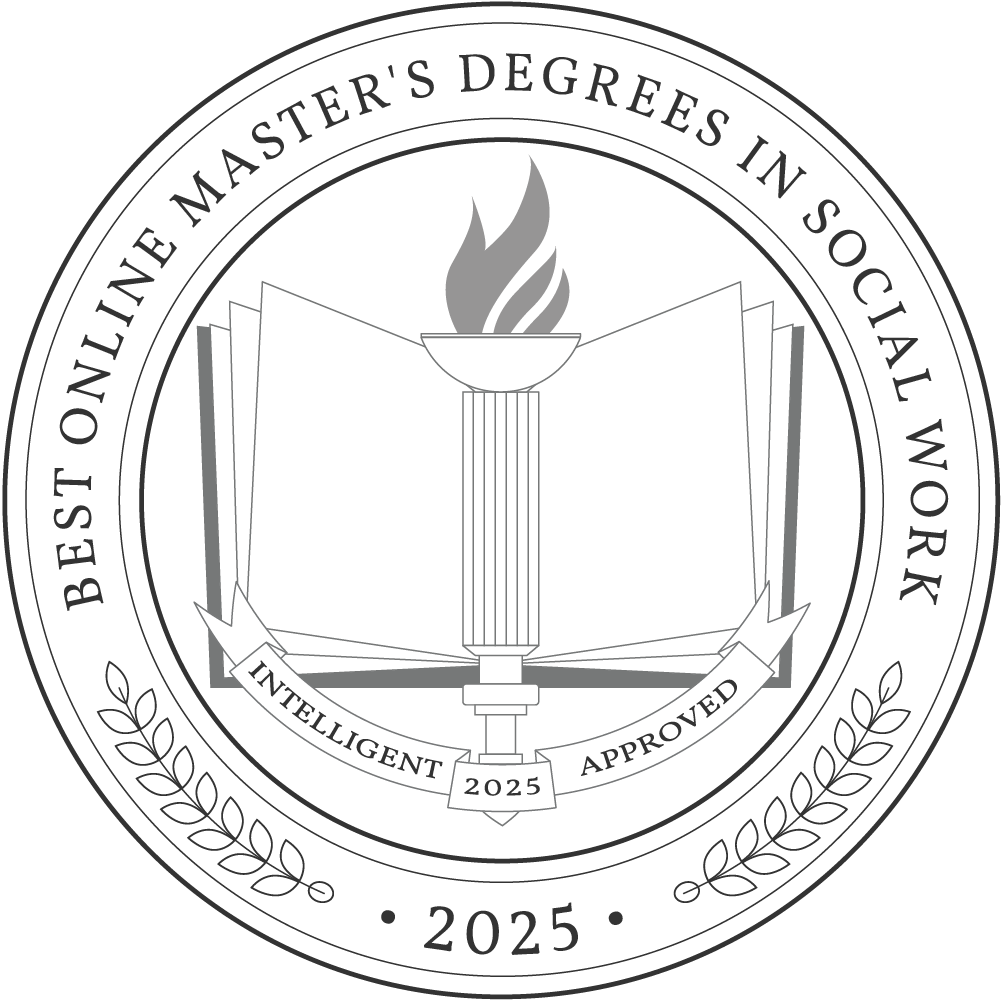Degrees in social work are available at all post-secondary levels, from associate to Ph.D. In the U.S., a Master in Social Work (MSW) is the standard degree that prepares students for the widest range of social worker jobs, including clinical positions.
Social work master’s degrees are available online from colleges throughout the country, many offering different types of specializations. To help students find the online master’s in social work degree that best suits their needs, Intelligent.com reviewed hundreds of programs based on factors like graduation rates, cost and ROI, student resources, and academic quality. The end result is a list of the top online social work master’s programs in the U.S. for 2024. Read our full ranking methodology here.
To provide additional insight into the field of social work and how to select and apply to a master’s program, we interviewed Leslie Reyna, an admissions counselor for the University of Texas at Arlington’s School of Social Work. This guide also features answers to frequently asked questions about cost, program duration, accreditation, and job outlook for social workers.
What is Social Work?
The National Association of Social Workers (NASW) defines the mission of social work as “enhanc[ing] human well-being and help[ing] meet basic and complex needs of all people, with a particular focus on those who are vulnerable, oppressed, and living in poverty.”
There are three types of social work practice, according to the Council on Social Work Education (CSWE):
- Micro-level, which involves direct work with individuals to help them cope with their situations.
- Mezzo-level, in which the social workers work with groups instead of individual clients
- Macro-level, where social workers lead and establish social change on a large scale through organizing, policy change, and public administration
Social workers work across diverse settings, including hospitals and healthcare settings, social services agencies, substance abuse treatment facilities, schools, prisons, private practices, and more.
A key distinction in social work jobs is non-clinical and clinical positions. Clinical social workers work directly with clients, either in individual or group settings, providing support for a variety of issues. Non-clinical social workers focus more on administration and policy, and don’t have the same direct contact with clients as clinical social workers.
To be a clinical social worker, an individual must earn a Master of Social Work (MSW) or similar degree and obtain a professional license in accordance with their state’s regulations and requirements. Each state sets its own requirements and procedures for licensure, and your choice of degree program may impact your ability to get licensed in the state where you plan to work. Therefore, it’s important to review your state’s educational requirements for licensure and ensure that your intended program fulfills them.
What Can I Do with a Master’s in Social Work?
While a master’s degree in social work is required for students who want to focus on counseling, it can also prepare students for a variety of other jobs, according to Reyna.
“A master’s degree in social work provides a foundation in project management, community outreach, service navigation, program evaluation, and nonprofit management,” she says. “This degree allows students to further explore the human service sector in a way that other related degrees do not.”
An MSW can prepare students for the following roles:
| Job Title | Average Yearly Salary | Projected Job Growth Rate* |
|---|---|---|
| Clinical Social Worker | $63,770 | 7% |
| Healthcare Social Worker | $62,940 | 10% |
| Child, Family, and School Social Worker | $53,940 | 5% |
| Mental Health and Substance Abuse Counselor | $55,960 | 11% |
| Social and Community Services Manager | $77,030 | 9% |
| Marriage and Family Therapist | $58,510 | 15% |
*Growth rate is projected from 2022-2032.
Source: U.S. Bureau of Labor Statistics (BLS).
Many social work jobs are defined by their context or environment, such as schools, medical hospitals, and facilities, psychiatric facilities, addiction treatment centers, or social services agencies. It’s common for MSW programs to offer specializations in these areas, so students should consider which type of setting they want to work in when selecting a program.
Why Trust Us
The Intelligent.com Higher Education Team is dedicated to providing students with independent, equitable school and program rankings and well-researched resources. Our expert-driven articles cover topics related to online colleges and programs, paying for school, and career outlooks. We use data from the U.S. Department of Education’s College Scorecard, the National Center for Education Statistics, and other reputable educational and professional organizations. Our academic advisory team reviews content and verifies accuracy throughout the year for the most current information. Partnerships do not influence rankings or editorial decisions.
- Analyzed over 2,000 national, accredited, and nonprofit colleges and universities
- 800+ rankings pages are reviewed and updated yearly
- Content is informed by reputable sources, surveys, and interviews with academic advisors and other experts
- Over 100 data points are reviewed for accuracy and quality throughout the year, including sources
How we rank schools
Our list features the best online Social Work Master’s degree programs at top colleges nationwide. Each school featured is a nonprofit, accredited institution — either public or private — with a high standard of academic quality for post-secondary institutions.
We evaluated each school’s program on tuition costs, admission, retention and graduation rates, faculty, reputation, and the student resources provided for online students. We collected data from trusted sources like the National Center for Education Statistics, individual school and program websites, school admissions counselors, and other data sources. Then, we calculated the Intelligent Score on a scale of 0 to 100 based on the following criterion:
Academic Quality:
- Admission rate versus enrollment rate
- Retention rate of students who return after year one
- Accreditation status (regional and programmatic)
- Nonprofit status, both private and public institutions
Graduation Rate
- Overall graduation rate
- Total number of currently enrolled students, including diversity metrics
- Student-to-faculty ratio
Cost and ROI
- In-state and out-of-state per-credit tuition rates and fees
- Required credits to graduate
- Earning potential after graduation
- Availability of federal student loans, scholarships, and other financial aid options
Student Resources
- Available student services for online-only and hybrid programs
- On-campus amenities like tutoring centers and the number of libraries
Read more about our ranking methodology.
Best 48 Accredited Online Master’s in Social Work Programs
FiltersInstitution Type
Status
- Intelligent Score
- Alphabetically By University Name
- Acceptance Rate
- Enrollment
- In-state Graduate Tuition
- Out-of-state Graduate Tuition
- In-state Undergraduate Tuition
- Out-of-state Undergraduate Tuition

Rutgers University - New Brunswick
Intelligent Score: 99.47In-state: $12,230
Out-of-state: $29,012
In-state: $17,736
Out-of-state: $17,736
SAT: 1180-1410
ACT: 25-32
$1,007
Online, On-Campus, Blended
Council on Social Work Education
39-60

University of Southern California
Intelligent Score: 99.08In-state: $59,260
Out-of-state: $59,260
In-state: $47,880
Out-of-state: $47,880
SAT: 1340-1530
ACT: 30-34
$2,137
Online, On-Campus
Council on Social Work Education
24-48

Columbia University School of Social Work
Intelligent Score: 98.59In-state: $57,864
Out-of-state: $57,864
In-state: $49,024
Out-of-state: $49,024
SAT: 1460-1570
ACT: 33-35
$1,854
Online, On-Campus
Council on Social Work Education
33-60

University of Houston
Intelligent Score: 98.24In-state: $8,449
Out-of-state: $20,665
In-state: $8,539
Out-of-state: $8,539
SAT: 1120-1310
ACT: 22-28
Resident: $474
Non-Resident: $994
Online, On-Campus
Council on Social Work Education
34-51

University of Georgia
Intelligent Score: 97.67In-state: $9,790
Out-of-state: $28,830
In-state: $8,878
Out-of-state: $8,878
SAT: 1250-1460
ACT: 29-33
$629
Online, On-Campus
Council on Social Work Education
60

University of Michigan
Intelligent Score: 96.16In-state: $16,520
Out-of-state: $53,669
In-state: $24,344
Out-of-state: $24,344
SAT: 1340-1520
ACT: 31-34
Resident: $1,846
Non-Resident: $2,927
Online, On-Campus
Council on Social Work Education
45

Fordham University
Intelligent Score: 95.14In-state: $54,730
Out-of-state: $54,730
In-state: $23,112
Out-of-state: $23,112
SAT: 1230-1410
ACT: 27-32
$1,045
Online, On-Campus
Council on Social Work Education
31-62

University of Nevada, Reno
Intelligent Score: 94.49In-state: $7,901
Out-of-state: $23,554
In-state: $5,657
Out-of-state: $5,657
SAT: 1060-1260
ACT: 20-26
In-State: $385
Out-of-State: $770
Online, On-Campus
Council on Social Work Education
30-60

Boston University
Intelligent Score: 94.32In-state: $56,854
Out-of-state: $56,854
In-state: $56,854
Out-of-state: $56,854
SAT: 1310-1500
ACT: 30-34
$956
Online, On-Campus, Blended
Council on Social Work Education
40-65

University of Denver
Intelligent Score: 93.96In-state: $52,596
Out-of-state: $52,596
In-state: $52,596
Out-of-state: $52,596
SAT: 1170-1360
ACT: 26-31
$1,164
Online, On-Campus
Council on Social Work Education
54-81

University of Illinois at Urbana - Champaign
Intelligent Score: 93.27In-state: $14,317
Out-of-state: $33,824
In-state: $15,016
Out-of-state: $15,016
SAT: 1200-1460
ACT: 27-33
$598
Online, On-Campus, Blended
Council on Social Work Education
44-72

Simmons University
Intelligent Score: 92.89In-state: $40,850
Out-of-state: $40,850
In-state: $21,528
Out-of-state: $21,528
SAT: 1060-1250
ACT: 24-29
$1,148
Online, On-Campus
Council on Social Work Education
34-65

Ohio University
Intelligent Score: 92.22In-state: $27,574
Out-of-state: $38,254
In-state: $18,138
Out-of-state: $18,138
SAT: 1070-1290
ACT: 22-27
In-State: $508
Out-of-State: $527
Online, On-Campus
Council on Social Work Education
36-62

Case Western Reserve University
Intelligent Score: 91.96In-state: $52,448
Out-of-state: $52,448
In-state: $47,920
Out-of-state: $47,920
SAT: 1340-1520
ACT: 31-34
$1,650
Online, On-Campus
Council on Social Work Education
39-60

Florida State University
Intelligent Score: 91.04In-state: $4,640
Out-of-state: $19,084
In-state: $9,684
Out-of-state: $9,684
SAT: 1220-1350
ACT: 27-31
In-State: $444
Out-of-State: $625
Online, On-Campus
Council on Social Work Education
39-61

Arizona State University
Intelligent Score: 91.02In-state: $10,710
Out-of-state: $28,800
In-state: $11,720
Out-of-state: $11,720
SAT: 1100-1320
ACT: 21-28
$561 - $1,343
Online, On-Campus
Council on Social Work Education
60

University of South Florida
Intelligent Score: 90.78In-state: $4,559
Out-of-state: $15,473
In-state: $8,350
Out-of-state: $8,350
SAT: 1160-1320
ACT: 25-30
$550
Online, On-Campus
Council on Social Work Education
35-60

The University of Texas Rio Grande Valley
Intelligent Score: 88.68In-state: $11,448
Out-of-state: $40,032
In-state: $12,028
Out-of-state: $12,028
SAT: 1210-1470
ACT: 26-33
Resident: $741
Non-Resident: $1,161
Online, On-Campus
Council on Social Work Education
33-63
How to Choose an Online Master’s in Social Work Degree Program
There are also personal considerations, including delivery format, program support, and program length. Students who need the flexibility to complete coursework on their own schedule may prioritize asynchronous programs with no designated class meetings. Other students may want the real-time interaction and support offered by synchronous programs that meet virtually at designated times.
Reyna notes that MSW degrees typically require 48 to 61 credits, which can impact how long it takes to complete the program. Some programs assign students internships, while others require students to find their own.
Lastly, Reyna says, students should consider the cost-to-income ratio. “Most students pursue an MSW with the idea that once they graduate, they’ll be making the high end of the salary range ($50,000),” she says. “However, most students usually start in the $40,000 to $45,000 range, depending on the state. With this in mind, students should choose a social work program that will provide them with the education but is also mindful of the starting salary range. Students need to consider whether a program that is over $60,000 a year is reflective of an entry-level social worker salary in their state.”
If you’re considering enrolling in an online MSW program, here are the steps to take to make it happen.
Step 1: Confirm that an online MSW degree program is right for you
Online learning can make earning an MSW more accessible, but it’s not for every student. Before enrolling in an online MSW program, consider your learning style in comparison to standard online instruction methods, including pre-recorded lectures, videos, reading assignments, and independent work. Reflect on your self-discipline, motivation, time management, and organizational skills, as these are crucial to success in an online program.
Take an honest assessment of where you are in your career and life to ensure an online MSW is the right step for you personally and professionally. If you are working, raising kids, caring for family, or fulfilling other responsibilities while earning your MSW, decide whether you can handle a full-time program or if you’ll need to complete courses part-time.
Clarity on your career goals is also important, as this will influence the specific program you choose. If you are interested in a particular specialization within social work, seek out programs that offer classes and hands-on experiences in that area.
For students who aren’t sure if social work is the right major, some related fields of study include human services, counseling, and public policy.
Step 2: Research schools and programs
As you research various programs, it’s helpful to set parameters to help you narrow the wide range of available options.
Parameters may include:
- Public or private institution
- Synchronous or asynchronous classes
- Fully remote or hybrid program
- Full-time, part-time or accelerated schedule
- Tuition, scholarships, and financial aid availability
As you dig deeper into your options, some additional questions to ask include:
- Who are the faculty, and what are their social work areas of expertise?
- What type of social work specialization options are available in this program?
- What’s the culture of the social work department and overall institution like?
- How do online students interact with classmates, faculty, and staff?
- What type of technical, academic, career, and mental health support services are available to online students?
You can get answers to these questions by visiting the school’s website, following the school and social work department on social media, and requesting digital or print admissions materials. Many schools offer virtual or in-person open houses, where students can speak to program representatives, faculty, and current students to get a well-rounded picture of the program.
Step 3: Select the school(s) to which you’ll apply
Some students choose to apply to multiple MSW programs to increase their odds of getting accepted, while others may select a specific program based on faculty, specialization options, or proximity. Your own personal needs will determine how many schools you apply to.
Keep in mind that most schools charge application fees, which can add up as you apply to more schools. If you’re concerned about application fees, contact the school’s admissions office to determine if they offer or accept fee waivers.
It’s helpful to create a spreadsheet or list with requirements and deadlines to keep track of application submissions and statuses. Missing deadlines or failing to submit required materials can have a negative impact on your application.
Step 4: Prepare and submit your application
The specific application processes will vary by program, but the process generally includes the following:
- Completing and submitting the application for admission
- Submitting official transcripts from any colleges you’ve attended
- Requesting recommendation letters from teachers, employers, or community members
- Writing an essay, if required
- Preparing for and taking standardized tests like the GRE, if needed.
Additional application requirements for MSW programs may include a copy of an LBSW license or prerequisite coursework for students who don’t have an undergraduate degree in social work.
Contact your school’s admissions office if you have questions about application materials and requirements.
Step 5: Determine how you’ll pay for your degree
Ideally, you’ve taken cost into consideration when choosing which program you’ll attend. You should also find out what types of financial aid you’re eligible for, including scholarships, grants, military discounts, work-study opportunities, and tuition assistance benefits from your employer.
If you’ll use student loans to help pay for your social work degree, be sure to complete the Free Application for Federal Student Aid (FAFSA). Not only does this determine your eligibility for federal student loans, but many schools also use the information from your FAFSA to grant need-based aid. We strongly encourage students to do extensive research into student loans and repayment options before committing to borrowing money to fund their social work degree.
Admission requirements for MSW programs
Each online MSW program sets its own admissions requirements and procedures, so it’s important to confirm the necessary steps with each program you’re applying to.
Generally speaking, students must submit the following materials to apply to a master’s program:
- Application
- Official transcripts for all colleges previously attended
- Letter(s) of recommendation
- Personal essay
- Resume
Reyna notes that there are two types of MSW programs that can impact a student’s eligibility and application process.
“Students who obtain a Bachelor of Social Work (BSW) from an accredited institution and maintain a 3.0 or higher GPA could possibly be admitted into their master’s program under an Advanced Standing status,” she says. “This means their MSW program is shorter because their BSW credits count toward the first year of the MSW program.”
Meanwhile, students entering an MSW from a different educational background may have to complete prerequisite courses, either before enrolling or in the first year of their program.
One application material students may not have to submit is standardized test scores, like the GRE, as Reyna notes that most programs have waived GRE requirements. However, students who have taken the GRE can check with their program to see if they are test-optional and if submitting GRE scores can supplement their application.
Online Master’s in Social Work Frequently Asked Questions
How much does an online master’s in social work degree cost?
As with program length, the answer to this question is, “It depends.”
According to EducationData.org, the average cost of public service master’s degrees, which include social work, public administration, and public health, is $72,770. However, many programs may be more affordable based on the type of institution and where a student lives.
Public institutions tend to charge lower tuition rates, particularly for students who live in the state where the school is located. According to the National Center for Education Statistics (NCES), the average in-state tuition for master’s programs at public universities in the 2020-21 academic year was $12,394. Meanwhile, the average tuition for master’s programs at private universities for the same time period was $28,445.
Some public universities now offer in-state tuition to all online students, regardless of where they live. Students can also lower their tuition sticker price through scholarships, grants, discounts for military service, and employer tuition reimbursement.
Ultimately, the cost of an online master’s in social work will vary by student. If you have questions about the cost of a program or paying for a social work degree, contact the school’s financial aid office to speak to a counselor.
How important is accreditation when selecting an online social work degree program?
“The biggest consideration students should have in mind when choosing an online social work program is ensuring that the program is accredited by the Council of Social Work Education,” Reyna says. “If students pursue an MSW at a university that does not have social work accreditation, they risk the chance of not being able to pursue licensure.”
According to the organization, CSWE-accredited social work programs “ensure the program mission is aligned with social work competencies to prepare students for professional practice…and ensure that students are prepared to practice safely, competently, and ethically with all clients, constituents, and the public.”
CSWE accredits both online and in-person MSW programs. Students can verify the accreditation status of a specific program through CSWE’s directory of accredited programs.
Students should also be mindful of institutional accreditation. Colleges in the U.S. can be regionally or nationally accredited, with regional accreditation being the more rigorous and widely accepted of the two. Regionally accredited schools only accept credits from other regionally accredited schools, which is important to keep in mind if you plan on pursuing another degree after your master’s. Students can confirm their school’s institutional accreditation through the Department of Education.
Should I get a master’s in social work degree online or in person?
The choice to get an MSW online or in person is a highly personal one, Reyna says.
Based on her own experiences with online learning, she says there are three key factors students must consider:
- The student’s ability to be a self-starter.
- The amount of time students have to dedicate to their schoolwork.
- The instructor’s teaching style and methods.
While all education requires motivation, online students, especially those in asynchronous programs, don’t have the same type of accountability from faculty and classmates. Students choosing to enroll online should be confident they’ll maintain their discipline throughout the school year.
Students should also be realistic with how much time they’ll be able to dedicate to their studies, especially if they’re also holding a job, caring for children or family members, or fulfilling other obligations. Online learning can save students time by not requiring travel, but students must still set aside adequate time to review lessons and complete assignments.
The way a student learns may also influence their decision to enroll in an online or on-campus social work master’s program. Individuals who learn best through lectures, reading assignments, and written assessments may be well-suited for online classes that rely primarily on these types of instruction methods. Meanwhile, students who prefer discussions and hands-on learning might learn better in in-person or synchronous online classes.
Is a master’s in social work degree worth it?
“The various career options and possibilities for growth and leadership make a master’s in social work worth it,” Reyna says.
Earning a master’s degree makes students eligible for social work licensure, opening up clinical and non-clinical job opportunities.
Within the next decade, employment in social work is expected to grow by 9% or roughly 75,000 jobs per year, according to the Bureau of Labor Statistics (BLS). This includes clinical and non-clinical positions in a variety of settings, including child and family social work, hospitals, substance abuse treatment facilities, and more.
Other Social Work Program Rankings
- Best Advanced Standing MSW Online
- Best One-Year MSW Programs Online (No BSW)
- Best Online MSW Programs (No GRE)
- Fastest Online Social Work Programs
- LMSW vs. LCSW: What’s the Difference?
- MSW vs. MSSW vs. MSSA: Which is Right for Me?
- MSW vs. LCSW: What’s the Difference?
- Salary Guide: How Much Does a Social Worker Make?


